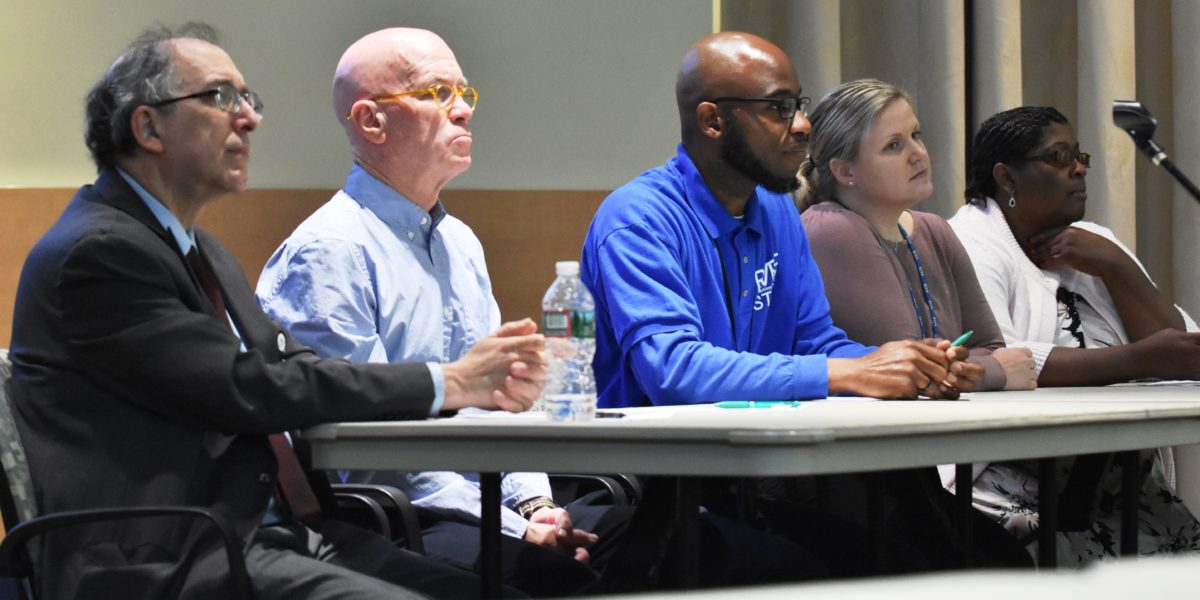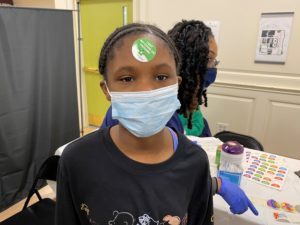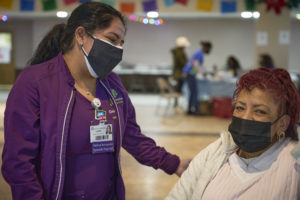Although there is no accurate count of elderly Delawareans who are homeless, there is evidence that their numbers are growing in Wilmington and the rest of the state, creating new challenges for social service providers seeking to help with everything from food to clothing and medication.
At the April meeting of the Community Partnership Initiative at the Gateway Conference Center, Wilmington Hospital, James M. Ellison, M.D., MPH, Swank Foundation Endowed Chair in Memory Care and Geriatrics, provided an overview on pathways to elder homelessness.
Based on a 2009 study that estimated the number of homeless people in Delaware at 1,479, it can be further estimated that there were close to 200 elderly homeless — though that number is probably low, Dr. Ellison said. He also estimated that 85 percent of the homeless elderly have a chronic medical condition.
“The number of older people is growing, and there are more ways for the elderly person to become homeless, and fewer ways to get out of homelessness,” said Dr. Ellison, who presented a comprehensive array of health data. “We also know there is a high rate of complicated medical, cognitive and behavioral problems that often go untreated.”
Dr. Ellison said that close to 600,000 people across the age spectrum are homeless in the U.S., with two-thirds living unsheltered. At the conclusion of his presentation, some energetic conversation took place among more than three dozen representatives of Wilmington social service agencies and staff from Christiana Care, on hand for the Community Partnership lunch.
In 2011, Christiana Care launched the Community Partnership Initiative, which brings together local organizations to share their mission, programs and efforts in helping the underserved, elderly, at-risk and homeless populations. The meetings, which are held monthly at Wilmington Hospital, are convened by Linda Brittingham, BCD, CCM, LCSW, corporate director of the Department of Social Work, and her staff.
Organizations involved in the initiative have updated information in the Homeless Survival Guide for the City of Wilmington, which has been given to homeless and at-risk individuals for the past 20 years. The guide includes information on shelter and housing, state service centers, financial assistance, health services, and resources for food, employment and drug and alcohol treatment.
“Our coming together has been invaluable in understanding the social resources in Wilmington,” said Joseph Hickey, executive director of Saint Patrick’s Center, a daytime drop-in center serving 1,500 families a month. The center provides emergency food, meals, respites, clothing, transportation and recreational activities for people in need on Wilmington’s east side. Individuals who use the center are often elderly and poor with basic needs.
“Our clients want to know where they get their next meal,” said Hickey. “Or they ask: How can I pay for medicine? Where can I get clothes to help my grandkids get back to school? When can I talk to a social worker?”
As a result of the Community Partnership Initiative, Christiana Care social workers have taken on the role of assisting the poor who come to Saint Patrick’s Center and that’s been a valuable addition to the center, said Hickey. “We’ve found people are reluctant to go to a doctor and hospital,” Hickey said. “It takes them out of their comfort zone. They prefer to stay in a community center where they have friends, feel secure and understand the system.”
Christiana Care clinicians shared perspectives on how medical services can be provided to the elderly. For instance, there is a pilot initiative being developed at Wilmington Hospital to assist older patients who come to the Emergency Department to set up primary care appointments, said Omar A. Khan, M.D., MHS, FAAFP, Service Line Leader, Primary Care & Community Medicine.
In addition, Melissa Morgan-Gouveia, M.D., a geriatrician in the Wilmington Adult Medicine Office of the Rocco A. Abessinio Family Health Center, explained her work with the Home Visit/ Independence at Home program. She said she is part of a multidisciplinary team providing primary care in the home for over 540 patients in New Castle County.
These are patients who are typically disabled and have a difficult time making an office visit. “Most patients are older but you do have to be homebound to use this service,” Dr. Morgan-Gouveia said.
Others playing an important role in discussing elderly homelessness included: Kevin L. Gaines, director of of Path Outreach at the Rick Vanstory Resource Center, which offers services to people in recovery from psychiatric disorders; and Lottie Lee, housing development coordinator, with the Delaware Division of Services for Aging and Adults with Physical Disabilities.



